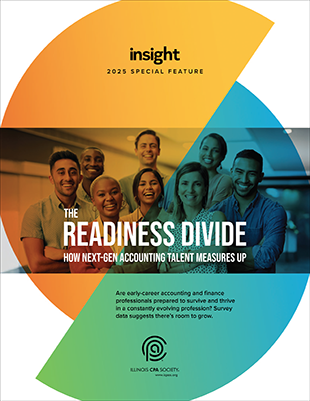New Illinois CPA Society research reveals readiness divide between early-career professionals and managers, with growing skills gaps fueling generational friction.
CHICAGO, Sept. 8, 2025 – In response to rising concerns about skills gaps, particularly among new hires, the Illinois CPA Society (ICPAS)—one of the largest state associations serving the certified public accountant (CPA) community—has gathered new survey data assessing the readiness of today’s early-career accounting and finance professionals. ICPAS’ findings are revealed in the 2025 Insight Special Feature, “The Readiness Divide: How Next-Gen Accounting Talent Measures Up.”
 Based on insights gathered from senior leaders across public accounting, corporate finance, and academia, along with feedback from emerging leaders managing new hires, ICPAS developed and launched a survey in early 2025 to measure how prepared early careerists felt in their first full-time roles and how prepared managers felt their early-career employees were.
Based on insights gathered from senior leaders across public accounting, corporate finance, and academia, along with feedback from emerging leaders managing new hires, ICPAS developed and launched a survey in early 2025 to measure how prepared early careerists felt in their first full-time roles and how prepared managers felt their early-career employees were.
Utilizing a survey covering 37 skills among six distinct categories—in addition to measuring perceptions around support for skills development, feedback, motivation to build new skills, and more related to workforce readiness—ICPAS fielded 470 responses comprised of 185 early careerists with less than five years of experience in the accounting and finance profession, and 285 managers who supervise employees with less than five years of experience.
The findings reveal wide divides and consistent disconnects between early-career professionals and those who manage them. Sharing some high-level takeaways, ICPAS found:
- Early careerists overestimated their readiness across all skills measured, consistently rating themselves 2.44 points higher on average than managers on a 10-point scale.
- Perceptions around communication and professionalism aren’t aligned. While early-career employees rated themselves strongly in these areas, managers consistently rated them low.
- Critical thinking and problem-solving skills fell short, with managers rating early-career employees’ skills in these categories lowest.
- Technological proficiency needs attention, as both early careerists and managers rated these skills low in real-world practice.
- Money doesn’t incentivize early-career employees to build new skills or learn something new at work, despite managers believing financial incentives are their leading motivator.
- Feedback is stuck in a loop: Managers say they’re giving it, but early-career employees don’t seem to think it (or maybe don’t hear it).
“The goal of our research was to better understand how prepared early-career professionals feel and how their managers perceive their readiness,” explains ICPAS President and CEO Geoffrey Brown, CAE. “We uncovered notable disconnects between expectations and experiences and pinpointed where additional support and skill building is needed. We hope these findings will spark action and inspire profession-wide conversations that shape new strategies, resources, and support systems that’ll help early-career accounting and finance professionals grow and thrive.”
The full survey findings are reported in “The Readiness Divide: How Next-Gen Accounting Talent Measures Up,” which is available in PDF and digital formats at www.icpas.org/readiness, and print editions are available upon request.
To further explore these findings and their implications for the profession, ICPAS is hosting a webinar, sponsored by Brilliant Staffing, on Oct. 1, 2025. The webinar will feature ICPAS experts and industry leaders discussing key insights and offering practical strategies to address talent readiness. Registration information is available here.
ICPAS welcomes feedback and has subject matter experts available for interviews on the factors impacting accounting and finance talent readiness.